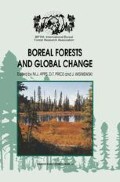Abstract
A major objective of environmental impact assessment (EIA) is prediction. Two major goals in science are: (1) explanation of observed phenomena, and (2) prediction. The EIA process makes use of the methods of academic science to provide the explanatory framework for the required data gathering which is needed for the scientifically valid prediction of effects. Follow-up monitoring after a development proceeds is required to test the predictions for their accuracy, important in both scientific and decision-making aspects of EIA. This testing is needed not only for future EIAs in the area, but also for ongoing project management. In boreal forest management, where EIA prediction is ecosystem-oriented rather than site-specific only, the EIA process needs to be tied to long-term, ecosystem-based forest management plans. This must be done via ongoing tests of predictions, and then by feeding the test-derived information back into a dynamic decisionmaking process. In Saskatchewan this unique and holistic application of the EIA process to long-term forest ecosystem management has been initiated by applying EIA to the twenty-year management plan required by the holder of any forest management agreement (FMA). This is an example of harnessing scientific predictive and testing capacity of the EIA process to set the stage for ecologically sustainable, integrated forest resource management. This also is an example of local action to address a global problem by ensuring the continued integrity of ecological processes in a portion of Canada’s boreal forest.
Access this chapter
Tax calculation will be finalised at checkout
Purchases are for personal use only
Preview
Unable to display preview. Download preview PDF.
References
Baskerville, G. L.: 1994, Who has the best forest management? Faculty of Forestry, Univ. British Columbia, Vancouver, Canada. ( Unpublished manuscript. )
Beanlands, G. E. and Duinker, P. N.: 1983, An Ecological Framework for Environmental Impact Assessment in Canada. Environment Canada, Hull, Quebec, 132 pp.
Brush, S. G.: 1989, Science 246, 1124–1129.
Caws, P.: 1969, Science 166, 1375–1380.
Conner, H. J. and Moote, M. A.: 1994, Environmental Management 18, 167–173.
Curtis, F.: 1994, A conceptual framework for environmental effects prediction and verification. Saskatchewan Environment and Resource Management, Regina, Canada. ( Unpublished manuscript. )
Dickman, M.: 1991, Environmental Impact Assessment Review 11, 171–180.
Epp, H. T.: 1992, In. Ingram G. B. and Moss, M. R. (eds.) Landscape Approaches and Wildlife Ecosystem Management. Proc. Second Symp. Can. Soc. Landscape Ecology and Management, Univ. British Columbia, Vancouver, Polyscience Publications Inc., Morin Heights, Canada, pp. 19–26.
Epp, H. T.: 1993, In: Marczyk, J. S. and Johnson, D. B. (eds.) Sustainable Landscapes. Proc. Third Symp. Can. Soc. Landscape Ecology and Management, Univ. Alberta, Edmonton, Polyscience Publications Inc., Morin Heights, Canada, pp. 69–81.
Epp, H. T. and Curtis, F. A.: 1994, Role of deductive science in environmental impact assessment. Saskatchewan Environment and Resource Management, Regina, Canada. (Unpublished manuscript.) Gillis, A. M.: 1990, Bioscience 40, 558–562.
Haila, Y.: 1982, Annales Zoologici Fennici 19, 255–263.
Hammond, H.: 1991, Seeing the forest among the trees: the case for wholistic forest use. Polestar Press Ltd., Vancouver, Canada, 309 pp.
Harris, W. C., Kabzems, A., Kosowan, A. L., Padbury, G. A. and Rowe, J. S.: 1983, Ecological Regions of Saskatchewan. Tech. Bull. 10. Forestry Division, Saskatchewan Parks and Renewable Resources, Regina, Canada, 57 pp.
Rolling, C. S. (ed.): 1978, Adaptive Environmental Assessment and Management. Wiley, New York, USA, 404 pp.
Kennedy, A. J. and Ross, W. A.: 1992. Environmental Management 16, 475–484.
Knudtson, P. and Suzuki, D.: 1992, Wisdom of the Elders. Stoddart, Toronto, Canada, 232 pp.
Leser, H. and Rodd. H.: 1991, In: Esser G. and Overdieck, D. (eds.). Modern ecology: Basic and Applied Concepts. Elsevier, The Netherlands, pp. 831–844.
Malik, M., and Bartlett, R. V.: 1993, The Environmental Professional 15, 34–45.
Popper, K. R.: 1959. The logic of scientific discovery. Hutchinson, London, UK.
Romesburg, H. C.: 1991. J. Wildlife Manage. 43, 293–313.
Rowe, J. S.: 1992. Forestry Chron. 68, 22–224.
World Commission on Environment and Development: 1987. Our Common Future. Oxford University Press, Oxford, UK, 400 pp.
Author information
Authors and Affiliations
Editor information
Editors and Affiliations
Rights and permissions
Copyright information
© 1995 Springer Science+Business Media Dordrecht
About this paper
Cite this paper
Epp, H.T. (1995). Application of Science to Environmental Impact Assessment in Boreal Forest Management: The Saskatchewan Example. In: Apps, M.J., Price, D.T., Wisniewski, J. (eds) Boreal Forests and Global Change. Springer, Dordrecht. https://doi.org/10.1007/978-94-017-0942-2_20
Download citation
DOI: https://doi.org/10.1007/978-94-017-0942-2_20
Publisher Name: Springer, Dordrecht
Print ISBN: 978-90-481-4605-5
Online ISBN: 978-94-017-0942-2
eBook Packages: Springer Book Archive

